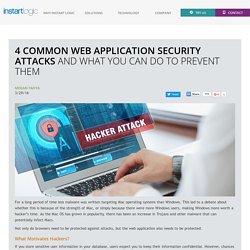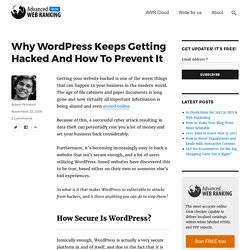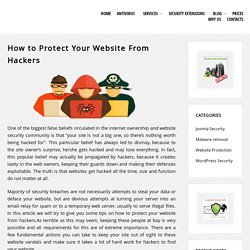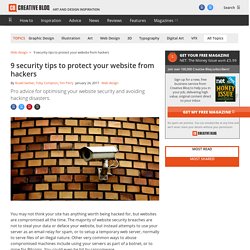

4 Common Web Application Security Attacks and What You Can Do to Prevent Them. For a long period of time less malware was written targeting Mac operating systems than Windows.

This led to a debate about whether this is because of the strength of Mac, or simply because there were more Windows users, making Windows more worth a hacker’s time. As the Mac OS has grown in popularity, there has been an increase in Trojans and other malware that can potentially infect Macs. Not only do browsers need to be protected against attacks, but the web application also needs to be protected. What Motivates Hackers? If you store sensitive user information in your database, users expect you to keep their information confidential. Proving they are a great hacker to the communityDestroying your database and causing great loss to your companyStealing user data on the fly using a man-in-the-middle attackDownloading sensitive user information and selling it on the black market What Makes an Application a Target?
What Are the 4 Most Common Attacks? Attack-specific solutions include: Why WordPress Keeps Getting Hacked And How To Prevent It. Getting your website hacked is one of the worst things that can happen to your business in the modern world.

The age of file cabinets and paper documents is long gone and now virtually all important information is being shared and even stored online. Because of this, a successful cyber attack resulting in data theft can potentially cost you a lot of money and set your business back considerably. Furthermore, it’s becoming increasingly easy to hack a website that isn’t secure enough, and a lot of users utilizing WordPress-based websites have discovered this to be true, based either on their own or someone else’s bad experiences. So what is it that makes WordPress so vulnerable to attacks from hackers, and is there anything you can do to stop them? How Secure Is WordPress? Ironically enough, WordPress is actually a very secure platform in and of itself, and due to the fact that it is open-source software, it’s much easier for security holes to be patched up.
Restrict Hackers and Spammers with 5 Drupal Modules. Website security lessons learned: What I do now to prevent hacking - The Garage. How to Protect Your Website From Hackers – Security Blog. One of the biggest false beliefs circulated in the internet ownership and website security community is that “your site is not a big one, so there’s nothing worth being hacked for”.

This particular belief has always led to dismay, because to the site owner’s surprise, he/she gets hacked and may lose everything. In fact, this popular belief may actually be propagated by hackers, because it creates laxity in the web owners, keeping their guards down and making their defenses exploitable. The truth is that websites get hacked all the time, size and function do not matter at all. Majority of security breaches are not necessarily attempts to steal your data or deface your website, but are devious attempts at turning your server into an email relay for spam or to a temporary web server, usually to serve illegal files. If your site uses third party plug-ins, you should stay updated with information about their updates and make sure all are implemented in a timely fashion.
Black Friday 2016: 15 ways to avoid being hacked online. 10 security tips to protect your website from hackers. You may not think your site has anything worth being hacked for, but websites are compromised all the time.

The majority of website security breaches are not to steal your data or deface your website, but instead attempts to use your server as an email relay for spam, or to setup a temporary web server, normally to serve files of an illegal nature. Other very common ways to abuse compromised machines include using your servers as part of a botnet, or to mine for Bitcoins. You could even be hit by ransomware. Hacking is regularly performed by automated scripts written to scour the Internet in an attempt to exploit known website security issues in software. Here are our top 10 tips to help keep you and your site safe online. 01.
It may seem obvious, but ensuring you keep all software up to date is vital in keeping your site secure. If you are using third-party software on your website such as a CMS or forum, you should ensure you are quick to apply any security patches. 02. 04. 05. 06. 7 Easy Steps To Secure Your Website From Hackers. As a website owner, is there anything more terrifying than the thought of seeing all of your work altered or entirely wiped out by a nefarious hacker?

You’ve worked hard on your website (and your brand) – so take the time to protect it with these basic hacking protections! In addition to regularly backing up your files (which you should already be doing, for various reasons), taking the following seven easy steps will help keep your website safe: Step #1: Keep platforms and scripts up-to-date.